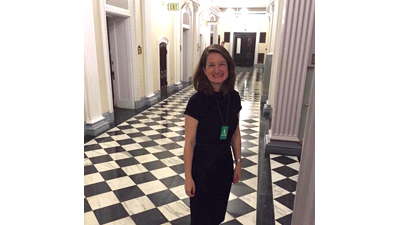Last week, I spoke at the White House at the Organ Donation Summit. People have asked me what it was like.
To understand what that day was like, you have to go back in time 20 years. You are now a graduate student in Social Psychology, living on $15,000 for seven years as you finish your PhD. You crash into the field of transplantation unexpectedly and are blown away by its beauty. Here, people are profoundly kind to one another. They give each other organs. People’s health is improved. Hope and joy is restored.
The field teaches you how to be a good person. It teaches you to be generous, and, when you forget, it reminds you. You decide to put down roots in this field, for good.
Eventually someone calls you Dr. Waterman. You move up the academic ladder at Washington University School of Medicine from Instructor to Associate Professor with tenure. You win your first grant for $24,500 from the Missouri Kidney Program to design education for potential living donors. Then, you win one million dollars from the Health Resources and Services Administration to design transplant education on a larger scale. You win grants every year after that until you have won more than $20 million dollars. You start a nonprofit to help disseminate the education you have developed, so that underserved patients and racial/ethnic minorities have this information. You move to the University of California, Los Angeles to see if you can do more.
You spend a lot of time attending meetings with other good people who lead the field. You have a lot of important people’s cell phone numbers. You get yelled at by doctors, but it’s all right because they are busy keeping people alive. You educate kidney patients and living donors, hundreds and thousands of them, so many that you can guess what they are going to say next. What they need echoes in your head. You read and write a lot of journal articles about what you are learning.
One day, you get a call from an “unknown caller.” When you pick up, it is a White House staffer, who is planning an Organ Donor Summit on June 13th. Can you attend? Can you speak about transplant education? There is only one answer.
In Washington DC, the morning of the Summit, you put on a black dress. You roller away the white cat hair that has traveled with you from Los Angeles. It is quiet. You walk the three blocks to the White House from your hotel. Outside security, in the cool sun, you meet 150 other good people who are there for the same reason. The mood is hushed. You are scared to go inside.
Once you are through security, standing on the black and white checkerboard floor where the Vice President’s office is, you get excited. You enter a conference room where you see the familiar royal blue backdrop of White House briefings. The patients, living donors, and leaders assembled all begin to smile. This is a thrill. People start hugging and taking selfies. President Obama has brought our cause to this national stage.
You step up to the podium. You speak between a Surgeon General and a Nobel Prize winner. You are just a UCLA Professor with two white cats. But you know something that you didn’t know, 20 years before. You know that you are the perfect person to speak here, because, man, do you love these patients.
You tell the room how transplant is the best of humanity and the best of healthcare. You tear up about the importance of improving education nationally for all Americans considering transplant and living donation. You talk about what is possible in our world because of the gift of donated organs. Many people in the room wipe their eyes. Your talk is livestreamed to a broader audience on the White House Live website. Your parents are watching.
When you sit down, you are shaking. You reach out and take the hand of the speaker next to you, a Chief Executive Officer of an organ recovery organization. You hold hands, as if you had been friends forever.
You look down at your phone. Patients and donors have emailed you from across the country to say they were crying, too. And to thank you for saying what you said.
What was it like to be at the White House that day? It was like locking arms with everyone in your field. It was like standing for being the national protector of patients and living donors. It was like standing for the possibility of the end of the organ donor shortage, an end only possible because of the ingenuity and kindness of the American people.
Years ago, a living donor told me that she became a poet after she donated her kidney to her mother because she learned the true meaning of her life. For that brief moment at the White House podium, I was an American Poet Laureate for our field.

